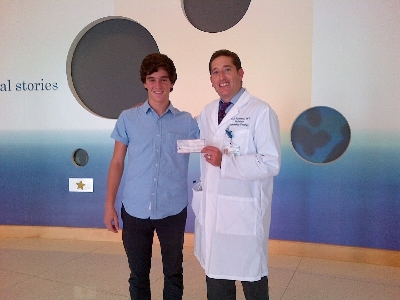Cameron Cohen, a 14-year-old iPhone applications creator and philanthropist, and his family recently donated $7,500 to fund pediatric cancer research at Mattel Children’s Hospital UCLA.
 Cameron Cohen (L), a 14-year-old app creator and philanthropist, recently donated a check to UCLA's Dr. Noah Federman to support his pediatric cancer research. The $7,500 donation was a combination of sales from his apps and his family. (Alice Del Rosario/UCLA)
Cameron Cohen (L), a 14-year-old app creator and philanthropist, recently donated a check to UCLA's Dr. Noah Federman to support his pediatric cancer research. The $7,500 donation was a combination of sales from his apps and his family. (Alice Del Rosario/UCLA)
The donation was a combination of proceeds from the sales of Cameron’s apps along with a contribution from his family.
The ninth grader presented the check to Dr. Noah Federman, an assistant professor of pediatric hematology–oncology and director of the pediatric bone and soft tissue sarcoma program at Mattel Children's Hospital UCLA.
“My family and I are proud to support Dr. Federman's ground-breaking work,” said Cameron.
Federman's research focuses on using targeted nanoparticles to treat pediatric sarcomas, which are aggressive and often lethal cancers of the bone and soft tissue. The survival rate for patients with these types of cancers when they have spread or relapsed is about 20 percent, even with aggressive chemotherapy, surgery and radiation treatments.
Cameron's road to philanthropy and app development started in March 2009, when he was a patient at UCLA Medical Center–Santa Monica, part of the UCLA Health System, where he underwent surgery for what turned out to be a benign bone tumor.
While recuperating from surgery at home, he taught himself the programming language for iPhone applications and developed an app for drawing on the iPhone called iSketch.
In November 2009, Apple Inc. accepted iSketch, and it quickly became a big hit. Cameron then donated $20,000 of the proceeds to help buy electronic and entertainment items for other pre-teens and teens to enjoy during their hospitalization at UCLA.
Following that success, he then created his second app for iPhones and iPads, a game called AnimalGrams (and AnimalGrams HD).
"I'm excited about supporting the research of Dr. Federman because I feel that his research on treatment of pediatric bone cancer using nanoparticles is extremely innovative and will hopefully lead to breakthroughs that will make an incredible difference in many kids' lives," Cameron said. "I feel a direct connection to his research, as I had a tumor in my leg bone, though mine was fortunately benign."